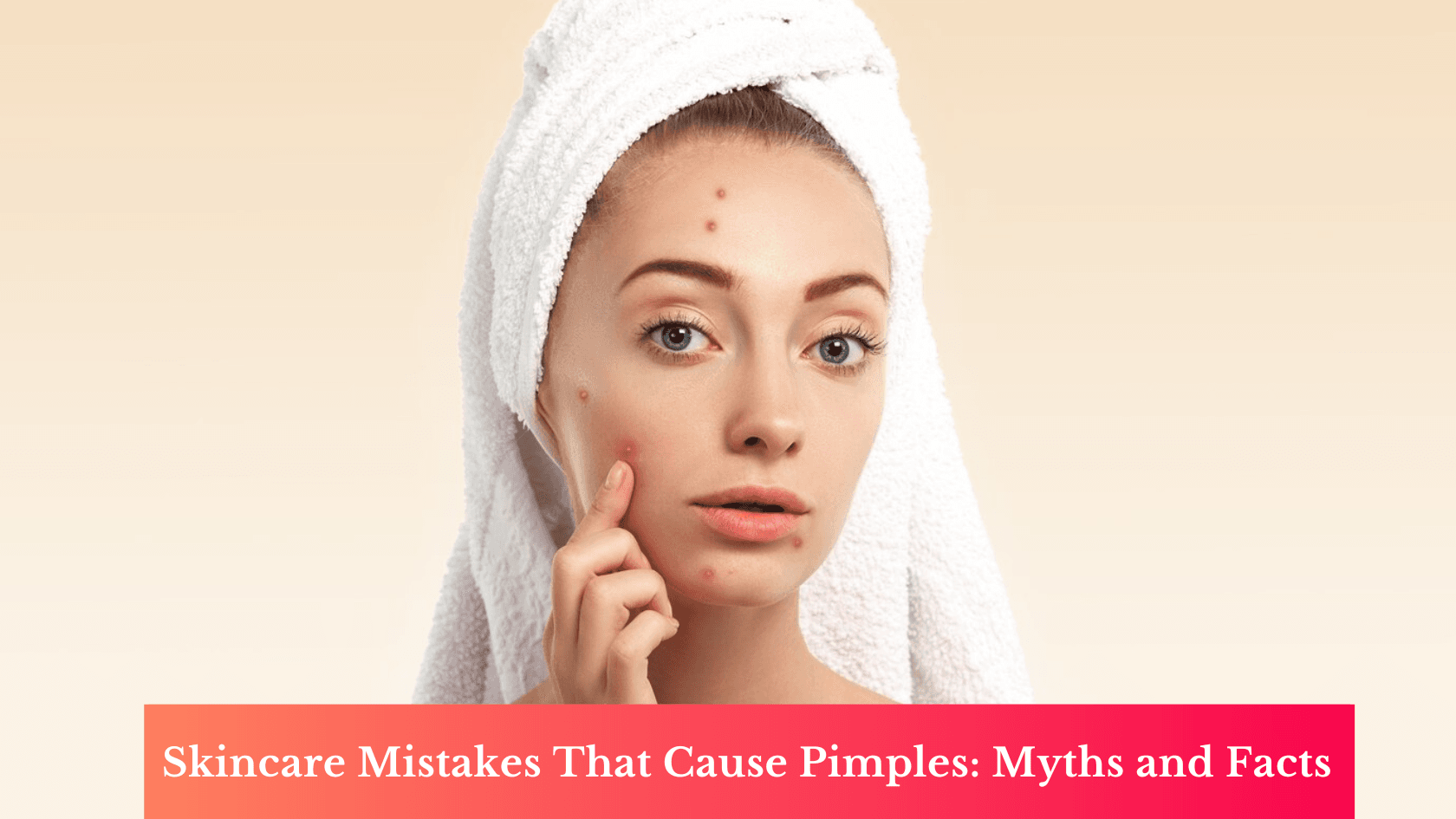Subtotal ₹0.00
Taking care of your skin is crucial, but sometimes, mistakes in your skincare routine can lead to unexpected breakouts. Pimples are often a result of these mistakes, which are exacerbated by common myths that misguide people into using the wrong products or following harmful habits.
Let’s dive into the myths and facts surrounding skincare mistakes that cause pimples and help you avoid them for a clearer, healthier complexion.
1. Over-Washing Your Face
- Myth: The more you wash your face, the cleaner and clearer it will be.
- Fact: While washing your face is important, over-washing can strip your skin of its natural oils, causing dryness. This, in turn, prompts your skin to produce more oil to compensate, leading to clogged pores and breakouts. Wash your face twice a day—once in the morning and once before bed—with a gentle cleanser that suits your skin type.
2. Skipping Moisturizer for Oily Skin
- Myth: Oily skin doesn’t need a moisturizer.
- Fact: Every skin type, including oily skin, needs hydration. Skipping moisturizer can cause the skin to dry out, which signals your glands to give even more oil, leading to acne. Opt for lightweight, non-comedogenic moisturizers that hydrate without clogging pores.
3. Using Harsh Exfoliants
- Myth: The more you exfoliate, the good your skin will be.
- Fact: Over-exfoliating can irritate your skin, remove its protective barrier, and cause inflammation, making you more prone to breakouts. Stick to exfoliating once or twice a week with a gentle exfoliant that helps remove dead skin cells without damaging your skin.
4. Popping Pimples
- Myth: Popping a pimple makes it go away faster.
- Fact: Squeezing or popping pimples may provide temporary relief, but it often worsens the condition. This action pushes bacteria deeper into the skin, causes scarring, and can even result in more pimples. Instead, use acne treatments containing ingredients like salicylic acid or benzoyl peroxide.
5. Using Too Many Products at Once
- Myth: Using more skincare products leads to good results.
- Fact: Overloading your skin with too many products—especially those containing active ingredients—can lead to irritation, redness, and breakouts. It’s essential to keep your skincare routine simple. Start with a cleanser, toner, moisturizer, and sunscreen. Slowly introduce one new product at a time to see how your skin reacts.
6. Ignoring Sunscreen
- Myth: Sunscreen causes acne, so it’s better to skip it.
- Fact: Skipping sunscreen is one of the biggest skincare mistakes. Sun exposure damages the skin and can cause premature aging and even skin cancer. Look for oil-free, non-comedogenic sunscreens formulated for acne-prone skin. Always wear sunscreen, even on cloudy days or indoors.
7. Not Removing Makeup Properly
- Myth: Sleeping with makeup on doesn’t harm the skin.
- Fact: Failing to remove your makeup before bed can clog pores, leading to breakouts. Always cleanse your face before sleeping, ensuring all makeup, dirt, and oil are removed. Use a gentle makeup remover or oil-based cleanser followed by your regular face wash.
8. Touching Your Face Frequently
- Myth: Touching your face doesn’t affect your skin.
- Fact: Your hands carry dirt, oil, and bacteria that can transfer to your face when you touch it, leading to clogged pores and acne. Avoid touching your face as much as possible to prevent breakouts.
9. Using Expired Products
- Myth: Expired skincare products are still safe to use.
- Fact: Using expired products can irritate your skin and even cause breakouts. Always check the expiration date on your skincare products, and if they smell odd or the texture has different, it’s time to toss them.
10. Believing Stress Doesn’t Affect Skin
- Myth: Stress doesn’t impact skin health.
- Fact: Stress causes the body to produce more cortisol, which can increase oil production and lead to acne. Manage stress through relaxation techniques like yoga, meditation, or regular exercise to keep both your mind and skin in good health.
Common FAQs About Skincare and Pimples:
Q1: Can drinking water alone clear up my acne?
Drinking water helps to keep your skin hydrated and boosted, but alone it won’t clear up acne. You need a consistent skincare routine, proper diet, and sometimes treatment from a dermatologist to keep acne under control.
Q2: Does acne mean my skin is dirty?
No, acne doesn’t necessarily mean your skin is dirty. It is often caused by clogged pores, hormones, or improper skincare, not just dirt.
Q3: Will using more acne treatments clear up my skin faster?
Using too many acne treatments can cause skin irritation and may worsen acne. It’s best to follow the prescribed or recommended treatment plan without overdoing it.
Q4: Does diet affect acne?
Yes, diet can affect acne. Foods high in sugar and dairy can sometimes contribute to breakouts. A balanced diet with plenty of fruits, vegetables, and water can improve your skin’s condition.
Q5: Can I use toothpaste on my pimples?
Toothpaste is not a recommended treatment for pimples. It can irritate the skin and cause more harm than good. Stick to proven acne treatments like salicylic acid or benzoyl peroxide.
Q6: Can my pillowcase cause pimples?
Yes, a dirty pillowcase can harbor bacteria and oil that may transfer to your skin, causing breakouts. Wash your pillowcases at least once a week.
Conclusion:
Skincare mistakes can be a leading cause of pimples, but understanding the myths and facts can help you build a routine that keeps your skin healthy and acne-free. Avoid over-washing, over-exfoliating, and using too many products at once. Instead, focus on a simple, consistent routine that includes proper hydration, sunscreen, and cleansing to maintain a clear complexion.



